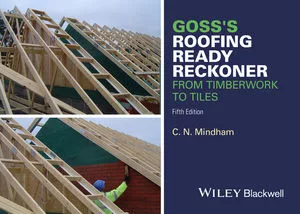GUEST COLUMN: Lessons From the Desert
There’s a strong opinion in the roofing industry that you have to get a lot of rain to get the calls you need to grow a business. That’s exactly the mindset of the storm chaser that goes from one rain-ravaged market to the next. I’m here to tell you that’s not true.

Last year, it rained twice in my market. You read that right - twice. And those two “storms” would barely show up on the radar for some of you reading this in the South or along the coast. They both amounted to a grand total of 1.5 inches! That’s why I’m known in the ranks of Roofers’ Success International as the Desert Roofer.
For a lot of companies, two sprinklings of rain a year would be tough to deal with. There’s a strong opinion in the roofing industry that you have to get a lot of rain to get the calls you need to grow a business. That’s exactly the mindset of the storm chaser that goes from one rain-ravaged market to the next. I’m here to tell you that’s not true. For those of you shaking in your boots at the thought of running a roofing company in a city where it very rarely rains, it’s time to shake that weather dependence. To help you do it, here are a few ideas to think about as you take a look at your company. Consider them lessons from the desert.
 1. Don’t depend on the weather.
1. Don’t depend on the weather.
If your business is built on bad weather, you’re one dry spell away from a bad year. There’s no doubt about it, weather is an opportunity. Even out here in the desert of Las Vegas, those two rain drizzles were big opportunities. We were slammed for weeks after those. But eventually all of those leads were run and those roofs were installed or repaired, and then it was back to business as usual. The key is to be weather-enhanced rather than weather-dependent. To do that, you need to build a presence in your market. Doing that means doing repairs and helping homeowners before they need to replace their roof. By doing that, you’ll be in a prime position to be the company to replace their roof when the time comes or when the storm hits.
2. Don’t depend on the Yellow Pages.
No one thinks about the roof until something goes wrong. When it does, they all go to the Yellow Pages because, for the most part, no one has a roofing company at their fingertips. Once they go to the Yellow Pages, your chances of having that customer call you drop dramatically. It’s tough to stand out among the other ads and listings that seem to grow every year. That’s why I don’t depend on the Yellow Pages to grow my business. Are we in there? Sure, we have an ad, but we don’t overdose on the Yellow Pages. If you have all of your marketing money tied up in a big Yellow Pages ad, you’re missing a great opportunity to market to homeowners directly. Ninety-five percent of the marketing that we do is direct mail, and that keeps our name in front of homeowners even when their roof is the last thing on their mind. We send out postcards and letters to homeowners and get them thinking about their roof in different ways before it starts leaking and before it rains.
3. Don’t depend on chance.
I know a lot of contractors run their companies with one hand over their eyes. At the end of the year they look around and see how everything shakes out. Did we make money this year? How much do we owe? If you’re going to succeed, in the desert or in the rainy Northwest, you can’t leave your business to chance. Track your results every day. Through Roofers’ Success International, we have a Daily Management Essentials form that we complete every day. When I look at that form, I know what we did yesterday, what we’re going to do today, and where we’re falling short. If we’re falling short of our daily goal, my team hits the phones and calls homeowners. We might offer them a special offer or an inspection to get out to their home. Even if their roof doesn’t need to be replaced, our technicians may find a repair that needs to be done to save them from a nasty leak down the road.
If you’re going to succeed and break the weather cycle, depend on your skill and the systems that you have in your business. If a successful roofing company can be built out here in the desert from startup to over $3 million in revenue in just three years, I’m confident that you can build a successful business wherever you are.

Last year, it rained twice in my market. You read that right - twice. And those two “storms” would barely show up on the radar for some of you reading this in the South or along the coast. They both amounted to a grand total of 1.5 inches! That’s why I’m known in the ranks of Roofers’ Success International as the Desert Roofer.
For a lot of companies, two sprinklings of rain a year would be tough to deal with. There’s a strong opinion in the roofing industry that you have to get a lot of rain to get the calls you need to grow a business. That’s exactly the mindset of the storm chaser that goes from one rain-ravaged market to the next. I’m here to tell you that’s not true. For those of you shaking in your boots at the thought of running a roofing company in a city where it very rarely rains, it’s time to shake that weather dependence. To help you do it, here are a few ideas to think about as you take a look at your company. Consider them lessons from the desert.

If your business is built on bad weather, you’re one dry spell away from a bad year. There’s no doubt about it, weather is an opportunity. Even out here in the desert of Las Vegas, those two rain drizzles were big opportunities. We were slammed for weeks after those. But eventually all of those leads were run and those roofs were installed or repaired, and then it was back to business as usual. The key is to be weather-enhanced rather than weather-dependent. To do that, you need to build a presence in your market. Doing that means doing repairs and helping homeowners before they need to replace their roof. By doing that, you’ll be in a prime position to be the company to replace their roof when the time comes or when the storm hits.
2. Don’t depend on the Yellow Pages.
No one thinks about the roof until something goes wrong. When it does, they all go to the Yellow Pages because, for the most part, no one has a roofing company at their fingertips. Once they go to the Yellow Pages, your chances of having that customer call you drop dramatically. It’s tough to stand out among the other ads and listings that seem to grow every year. That’s why I don’t depend on the Yellow Pages to grow my business. Are we in there? Sure, we have an ad, but we don’t overdose on the Yellow Pages. If you have all of your marketing money tied up in a big Yellow Pages ad, you’re missing a great opportunity to market to homeowners directly. Ninety-five percent of the marketing that we do is direct mail, and that keeps our name in front of homeowners even when their roof is the last thing on their mind. We send out postcards and letters to homeowners and get them thinking about their roof in different ways before it starts leaking and before it rains.
3. Don’t depend on chance.
I know a lot of contractors run their companies with one hand over their eyes. At the end of the year they look around and see how everything shakes out. Did we make money this year? How much do we owe? If you’re going to succeed, in the desert or in the rainy Northwest, you can’t leave your business to chance. Track your results every day. Through Roofers’ Success International, we have a Daily Management Essentials form that we complete every day. When I look at that form, I know what we did yesterday, what we’re going to do today, and where we’re falling short. If we’re falling short of our daily goal, my team hits the phones and calls homeowners. We might offer them a special offer or an inspection to get out to their home. Even if their roof doesn’t need to be replaced, our technicians may find a repair that needs to be done to save them from a nasty leak down the road.
If you’re going to succeed and break the weather cycle, depend on your skill and the systems that you have in your business. If a successful roofing company can be built out here in the desert from startup to over $3 million in revenue in just three years, I’m confident that you can build a successful business wherever you are.
Links
Looking for a reprint of this article?
From high-res PDFs to custom plaques, order your copy today!






